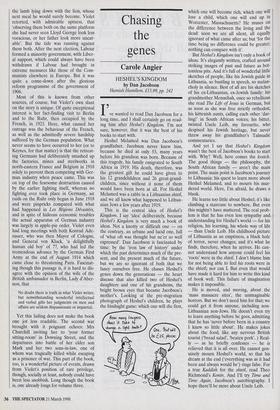Chasing the genes
Carole Angier
HESHEL'S KINGDOM by Dan Jacobson Hamish Hamilton, f15.99, pp. 242 ve wanted to read Dan Jacobson for a I long time, and I shall certainly go on read- ing him after Heshel's Kingdom. I'm not sure, however, that it was the best of his books to start with.
Heshel Melamed was Dan Jacobson's grandfather. Jacobson never knew him, because he died at only 53, many years before his grandson was born. Because of this tragedy, his family emigrated to South Africa in 1919. His death, therefore, was the greatest gift he could have given to his 12 grandchildren and 26 great-grand- children, since without it none of them would have been born at all. For Heshel Melamed was a rabbi in a Lithuanian shtetl, and we all know what happened to Lithua- nian Jews a few years after 1919.
This is the central idea of Heshel's Kingdom. I say 'idea' deliberately, because Heshel's Kingdom is very much a book of ideas. Not a knotty or difficult one — on the contrary, an urbane and lucid one, full of 'what oft was thought but ne'er so well expressed'. Dan Jacobson is fascinated by time: by the 'iron law of history' under which the past determines much of the pre- sent, and the present much of the future, but we are so ignorant of both that we fancy ourselves free. He chases Heshel's genes down the generations — the heart disease that also killed two of Heshel's daughters and one of his grandsons, the bright brown eyes that became Jacobson's mother's. Looking at the pre-migration photograph of Heshel's children, he plays the hindsight game: which one will die first, which one will become rich, which one will lose a child, which one will end up in Worcester, Massachusetts? He muses on the difference between the living and the dead: soon we are all silent, all equally ignorant of what came after us; but 'for the time being no difference could be greater; nothing can compare with it'. But Heshel's Kingdom isn't only a book of ideas. It's elegantly written, crafted around striking images of past and future as bot- tomless pits. And it's full of wonderful little sketches of people, like his Jewish guide in Lithuania, so bustling in speech, so melan- choly in silence. Best of all are his sketches of his ex-Lithuanian, ex-Jewish family: his grandmother Menuchah, once so rebellious she read The Life of Jesus in German, but as soon as she was free strictly orthodox; his kittenish aunts, calling each other °dar- ling!' in South African voices; his bitter, twisted Uncle Leib, my favourite, who despised his Jewish heritage, but never threw away his grandfather's Talmudic commentaries.
And yet I say that Heshel's Kingdom wasn't the best of Jacobson's books to start with. Why? Well, here comes the kvetch. The good things — the philosophy, the South African family — aren't the main point. The main point is Jacobson's journey to Lithuania: his quest to learn more about Heshel Melamed, and to mourn his mur- dered world. Here, I'm afraid, he draws a blank.
He learns too little about Heshel; it's like climbing a staircase to nowhere. But even this mightn't have mattered. The real prob- lem is that he has even less sympathy and understanding for Heshel's world — for his religion, his learning, his whole way of life — than Uncle Leib. His childhood picture of Lithuania as an emptiness, a black hole of terror, never changes; and it's what he finds, therefore, when he arrives. He can- not understand how anyone could feel his `roots' were in the shtetl. I don't blame him for not being able to feel his roots were in the shtetl; nor can I. But even that would have made it hard for him to write this kind of book well. This failure of imagination makes it impossible.
He is moved, and moving, about the `mass massacre sites', the unimaginable horrors. But we don't need him for that; we could get it from anyone, including non- Lithuanian non-Jews. He doesn't even try to learn anything before he goes, admitting that he has 'never before been in a country I knew so little about'. He makes jokes about the food, like any nervous British tourist (tread salad', 'beaten pork'. ) Real- ly — as he briefly confesses — he is relieved that it is all over. He cannot gen- uinely mourn Heshel's world, so that his dream at the end (`everything was as it had been and always would be') rings false. For a true Kaddish for the shtetl, read Theo Richmond's Konin. And I'll try Time and Time Again, Jacobson's autobiography. I hope there'll be more about Uncle Leib.




































































 Previous page
Previous page